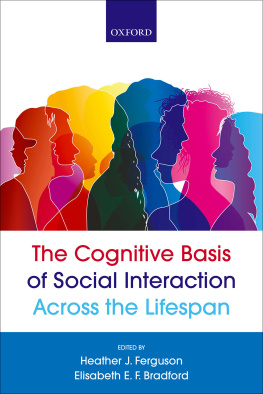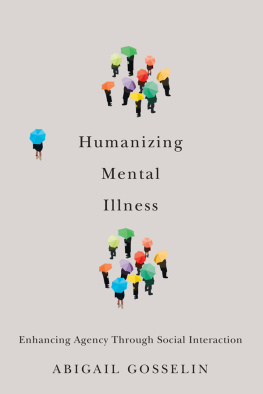The Cognitive Basis of Social Interaction Across the Lifespan

Great Clarendon Street, Oxford, OX2 6DP,
United Kingdom
Oxford University Press is a department of the University of Oxford. It furthers the Universitys objective of excellence in research, scholarship, and education by publishing worldwide. Oxford is a registered trade mark of
Oxford University Press in the UK and in certain other countries
Oxford University Press 2021
The moral rights of the authors have been asserted
First Edition published in 2021
Impression: 1
All rights reserved. No part of this publication may be reproduced, stored in a retrieval system, or transmitted, in any form or by any means, without the prior permission in writing of Oxford University Press, or as expressly permitted by law, by licence or under terms agreed with the appropriate reprographics rights organization. Enquiries concerning reproduction outside the scope of the above should be sent to the Rights Department, Oxford University Press, at the address above
You must not circulate this work in any other form and you must impose this same condition on any acquirer
Published in the United States of America by Oxford University Press
198 Madison Avenue, New York, NY 10016, United States of America
British Library Cataloguing in Publication Data
Data available
Library of Congress Control Number: 2021933317
ISBN 9780198843290
eISBN 9780192581334
DOI: 10.1093/oso/9780198843290.001.0001
Oxford University Press makes no representation, express or implied, that the drug dosages in this book are correct. Readers must therefore always check the product information and clinical procedures with the most up-to-date published product information and data sheets provided by the manufacturers and the most recent codes of conduct and safety regulations. The authors and the publishers do not accept responsibility or legal liability for any errors in the text or for the misuse or misapplication of material in this work. Except where otherwise stated, drug dosages and recommendations are for the non-pregnant adult who is not breast-feeding
Links to third party websites are provided by Oxford in good faith and for information only. Oxford disclaims any responsibility for the materials contained in any third party website referenced in this work.
Acknowledgements
This book was prepared with the support of a European Research Council grant to Heather Ferguson (Ref: CogSoCoAGE; 636458). This grant supported Elisabeth Bradford, Victoria Brunsdon, and Martina de Lillo, the authors of , Muireann Irish was supported by an Australian Research Council Future Fellowship (FT160100096), and Siddharth Ramanan by a University of Sydney, Faculty of Science Ph.D. Research Scholarship.
Thanks are due to Camilla Woodrow-Hill for help with proofreading and formatting draft chapters, and to Netanel Weinstein for providing comments on earlier versions of
Contents
Heather J. Ferguson
Tobias Schuwerk and Hannes Rakoczy
Serena Lecce and Rory T. Devine
Sarah Donaldson and Kathryn Mills
Ian A. Apperly and J. Jessica Wang
Victoria E. A. Brunsdon, Elisabeth E. F. Bradford, and Heather J. Ferguson
Lucy A. Livingston and Francesca Happ
Muireann Irish and Siddharth Ramanan
Elisabeth E. F. Bradford, Martina De Lillo, and Heather J. Ferguson
Ian A. Apperly, Professor of Cognition and Development, School of Psychology, University of Birwmingham, UK
Elisabeth E. F. Bradford, Lecturer in Psychology, School of Social Sciences, University of Dundee, UK
Victoria E. A. Brunsdon, Postdoctoral Research Associate, School of Psychology, University of Kent, UK
Martina De Lillo, Doctoral Student, School of Psychology, University of Kent, UK
Rory T. Devine, Lecturer in Developmental Psychology, School of Psychology, University of Birmingham, UK
Sarah Donaldson, Doctoral Student, Department of Psychology, University of Oregon, USA
Heather J. Ferguson, Professor in Psychology, School of Psychology, University of Kent, UK
Francesca Happ, Professor of Cognitive Neuroscience, Institute of Psychiatry, Psychology & Neuroscience, Kings College London, UK
Muireann Irish, Professor of Cognitive Neuroscience, School of Psychology, Brain and Mind Centre, University of Sydney, Australia
Serena Lecce, Associate Professor in Developmental and Educational Psychology, Department of Brain and Behavioral Science, University of Pavia, Italy
Lucy A. Livingston, Lecturer in Psychology, School of Psychology, Cardiff University, UK
Kathryn Mills, Assistant Professor, Department of Psychology, University of Oregon, USA
Hannes Rakoczy, Developmental Psychologist, Department of Developmental Psychology, University of Gttingen, Germany
Siddharth Ramanan, Postdoctoral Research Associate, MRC Cognition and Brain Sciences Unit, University of Cambridge, UK
Tobias Schuwerk, Clinical and Developmental Psychologist, Department of Developmental and Educational Psychology, Ludwig-Maximilians-University of Munich, Germany
J. Jessica Wang, Lecturer in Psychology, Department of Psychology, Lancaster University, UK

Ian A. Apperly
Ian Apperly is a Professor of Cognition and Development in the School of Psychology at the University of Birmingham. He studied natural sciences at Cambridge University and completed his PhD at the University of Birmingham. His main research interest is in mindreadingthe ability to take other peoples perspectives for communication, cooperation, competition, or deceptionand he has built a strong international profile in this area. His work has been supported by funders including the Economic and Social Research Council, Medical Research Council, and Leverhulme Trust, and he authored a book, Mindreaders: The Cognitive Basis of Theory of Mind, in 2010. He has received prizes from the British Psychological Society and the Experimental Psychology Society.

Elisabeth E. F. Bradford
Elisabeth Bradford is a Lecturer in Cognitive and Developmental Psychology at the School of Social Sciences, University of Dundee (Scotland, UK). She completed her PhD at the University of St Andrews in 2016. Prior to her lectureship at the University of Dundee, Lizzie worked as a Postdoctoral Research Associate at the University of Kent (England, UK). Her research focuses on social cognition abilities, examining how these capacities change and develop across the lifespan, the impacts of deficits in social cognition abilities, how social cognition may vary across cultures, and the factors that may underlie successful engagement of social cognition abilities at different ages (e.g. executive functions).

















